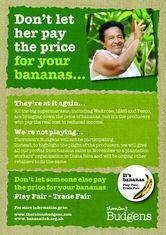
An independent store owner has taken a stand against the supermarkets as he looks to turn the tide in the banana price wars.
Andrew Thornton, who owns two Budgens stores in north London, has hit out at the UK’s biggest supermarkets, which are waging a price war on bananas that threatens to do lasting damage to plantation workers in developing countries, he claims.
Thornton has launched a campaign, Play Fair, Trade Fair, which will see his stores donate all of their profits on bananas to an organisation for plantation workers in Costa Rica though charity Banana Link.
Asda has sparked a row over banana prices in the last month, cutting prices to 38p a kilo, while prices at Morrisons, Marks & Spencer and Waitrose are also described as “stupidly low” by Thornton.
In 2002, before the last banana “price war”, the price per kilo in major supermarkets was £1.10.
Banana Link established that after the last major banana price war, the workers get two to three per cent of the retail price of a banana; the supermarkets get 40 per cent. Where the product is Fairtrade, the small farmers' and workers' share rises to 12 per cent.
The same Banana Link study identified that to earn the weekly minimum wage in Costa Rica, many workers had to work 15 hours a day, six days a week; their average wage per hour is a mere 33p.
Thornton currently sells bananas at £1.12 per kilo, making around £8,000 per month, and was inspired by the work of Bananalink in responding to the Asda-initiated cuts.
He told freshinfo: “Bananalink’s work really struck a chord and I really thought I needed to take a stand before this went too far. I am aware there are many categories this occurs in but the banana wars highlights this.
“It is important that consumers understand the implications of buying produce at such a low price on the people who produce it. I would like other Budgens stores to follow suit as well as some of the larger, ethically minded supermarkets such as M&S and Waitrose.
“The supermarkets are not going to continue to absorb these losses forever and ultimately it will be a first if it doesn’t get pushed down the supply chain to the producer.”
Thornton also pointed to the Windward Islands, where the banana trade depends largely on the UK supermarkets for their survival. In 1992, they had 24,000 banana farms; today there are a mere 4,000.
He added that other retailers could join his campaign by downloading flyers at www.thorntonsbudgens.com to inform customers.



